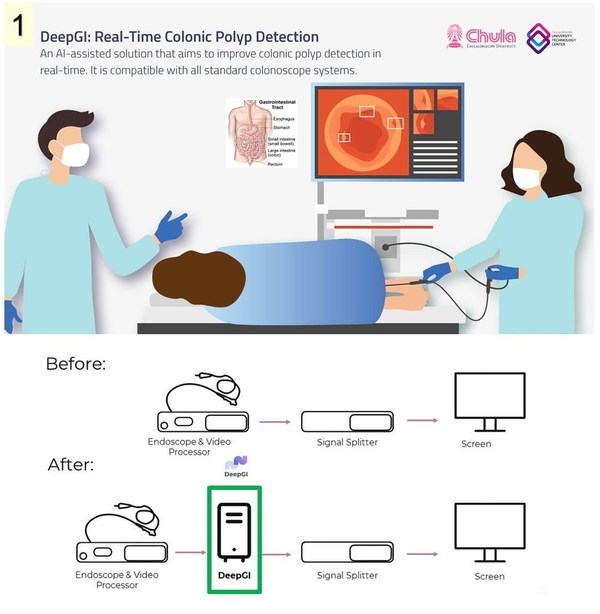BANGKOK, May 26, 2022 /PRNewswire/ -- Chula Engineering and Chula Medicine co-invent an innovative device for a rapid gastrointestinal cancer detection that yields accurate results hoping to foster preventive medicine in gastrointestinal malignancy and reduce the number of cancer patients.

Many types of cancer can be treated if found at an early stage, such as gastric and colorectal cancer, the third and fourth leading causes of cancer deaths in the world (after lung and liver cancer). This is especially true with colorectal cancer, the topmost common among many patients in Thailand and is likely to increase proportionately with an increasing elderly population.
Current statistics show that in 2021, 15 million seniors (over 50 years old) in Thailand are at risk of developing colorectal cancer.
"For seniors, the risk of colorectal cancer increases, so it is advisable for people at the aged of 50 and over to undergo for a regular colonoscopy every 5-10 years to detect early neoplasm such as colonic polyp. If this population can access to such health services, it will be a comprehensive approach that allows patients to be tested and treated promptly at the curable stage, which can help reduce the rate of illness and death from the disease."
This is the rationale behind the latest AI innovation from Chulalongkorn University — "DeepGI" gastrointestinal monitor to help detect abnormal polyps in the colon co-developed by Associate Professor Dr. Peerapon Vateekul, Department of Computer Engineering, Faculty of Engineering, Chulalongkorn University, with Professor Dr. Rangsun Rerknimitr, M.D., Associate Professor Dr. Satimai Aniwan, M.D., and Lecturer Kasenee Tiankanon, M.D. from the Excellence Center for GI Endoscopy, King Chulalongkorn Memorial Hospital, the Thai Red Cross Society.
With the support from Chulalongkorn University Technology Center (UTC) and ESM Solutions Co., Ltd., the research team has collected colonoscopy data images since 2019 until they successfully developed DeepGI or Deep Technology for Gastrointestinal Tracts to detect abnormality in GI tracts and later the system has launched in the real patients at the King Chulalongkorn Memorial Hospital since late 2021.
Accurate colonic polyp detection by AI even in the obscure images
The colon cancer warning signs that we are able to observe on our own include mucus in stool, lumps found in the lower right abdominal area through palpation, small stool size (a result of large cancerous growth blocking the colon), irregular bowel movement, e.g., constipation, chronic diarrhea, alternating constipation and diarrhea, weight loss, loss of appetite, etc. which are the symptoms of the late stage of colon cancer.
"Therefore, you should not wait for symptoms to appear first. If you are over 50 or have risk factors, it is recommended that you receive a colonoscopy or other screening procedures according to the standard guideline. This action should be done earlier in those who have a family history of colon cancer or have suffered from chronic colitis."
Currently, colonoscopy or lower GI endoscopy are the standard approach to detect abnormalities that representing early colonic neoplasm such as polyps in the colon. The procedures are quite challenging due to the various forms of polyps: raised ones, and flat ones that grow on the surface of the intestines. They may be small, and the color may blend in with the surrounding area, making it easy to be misdiagnosed if the endoscopists are less experience or fatigue. According to statistics, up to 22 percent of tests can be an erroneous.
Assoc. Prof. Dr. Peerapon Vateekul, from the Faculty of Engineering, Chulalongkorn University, discussed the development of an AI-assisted solution system that helps endoscopists to work more efficiently and reduce such mistakes, "DeepGI will process the images captured from the video footage during the procedure and detect abnormalities by the AI using machine learning technique called "Deep Learning". The model will set a bounding box annotating the abnormal area and alert doctors in real-time with over 90 percent accuracy. The AI will also accurately produce characterization of the polyps if they are potentially becoming malignant in the future (Neoplastic) or benign (Hyperplastic). This additional capability supports doctors' confidence in their diagnoses."
DeepGI Highlights
DeepGI is a gastrointestinal disorder detection system with four highlights:
Further utilization and expansion to the community endoscopists
Assoc. Prof. Dr. Peerapon explained that DeepGI is currently in the process of applying for a national patent and continues to develop with the Technology Readiness Level 5 (TRL5). "Apart from abnormal tissue detection, DeepGI can also classify if it is malignant (neoplastic) or benign (hyperplastic) without the need for biopsy. We are expanding DeepGI's capability to test other organs such as the stomach and bile ducts."
"I hope this innovation will be widely used as the aid for practicing endoscopists at other hospitals, especially in the community setting who have shortages of medical and technological personnel."
Interested health institutions can contact Associate Professor Dr. Peerapon Vateekul, Department of Computer Engineering, Faculty of Engineering, Chulalongkorn University, via email at peerapon.v@chula.ac.th or via the website https://deepgi.cp.eng.chula.ac.th/
The general public wishing to receive innovative gastrointestinal disorders tests to prevent gastrointestinal cancer via DeepGI can make an appointment at the Excellence Center for GI Endoscopy, King Chulalongkorn Memorial Hospital, the Thai Red Cross Society, Bhumisiri Mangkhalanusorn Building, 10th floor, Zone A, Telephone +66-2256-4000 ext. 81001-2.
For the full release and more images, please visit: https://www.chula.ac.th/en/highlight/73670/
About Chulalongkorn University
Chulalongkorn University sets the standard as a university of innovations for society and is listed in the World's Top 100 Universities for Academic Reputation, in the Quacquarelli Symonds (QS) World University Rankings 2021.







